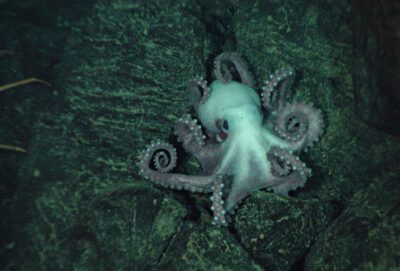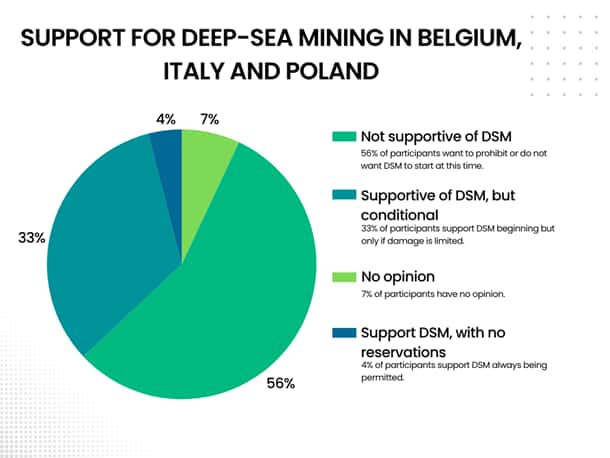
Over half of Europeans polled (56%) oppose deep-sea mining and support a temporary ban on this new industry. This is according to representative research by Ipsos commissioned by the citizens’ movement WeMove Europe, Seas At Risk and the Deep Sea Conservation Coalition. This finding comes at a crucial time as world governments convene at the International Seabed Authority (ISA) in Kingston, Jamaica to negotiate whether to open the ocean to deep-sea mining, despite escalating global opposition and significant regulatory and environmental concerns. WeMove Europe, Seas At Risk and the Deep Sea Conservation Coalition urge European countries to support and promote a moratorium or precautionary pause on deep-sea mining at the ISA before it is too late.
Deep-sea mining is the process of mining minerals and metals found in the deep sea. Scientists warn that we still know very little about life in the deep sea but what is certain is that deep-sea mining would cause permanent and irreversible impacts on deep-sea ecosystems and species, would hinder the deep’s ability to sequester and store carbon, and have other far-reaching harmful effects on the water column.
Public support for a moratorium or precautionary pause on deep-sea mining
Currently, commercial deep-sea mining has not begun in international waters, but soon countries throughout Europe, such as Belgium, Italy and Poland – three countries that have not yet spoken out for a pause – will have to determine whether deep-sea mining can be allowed. When asked about action regarding deep-sea mining, the poll conducted between 3-7 July shows that 56% of Belgian, Italian and Polish people do not want to allow deep-sea mining at this time, 33% want to allow mining if the damage is limited, 7% have no opinion and only 4% always want to allow mining without reservations. This corresponds with a comparable poll of Dutch citizens conducted by Greenpeace Netherlands which found that 61% did not want to allow deep-sea mining at this time.
Rachel Walker-Konno, from WeMove Europe, emphasises:

“Deep- sea mining is devastating for life in the deep sea. 145,.000 Europeans have already signed a petition to stop deep-sea mining and this research further shows that people throughout Europe want the deep sea and everything that lives there to be protected from the dredging machines of deep-sea mining companies. The deep sea is the last virtually untouched ecosystem on Earth. This is our chance to stop an environmental catastrophe before it happens.”
Ecological concern biggest driver for citizens opposing deep-sea mining
The survey shows that deep-sea mining is a relatively unknown phenomenon. Only 13% of respondents in the representative sample knew exactly what deep-sea mining entails. After being given a brief description and the possible advantages and disadvantages, 46% of respondents said they were against deep-sea mining, while only 25% said they were in favour of it. Respondents’ main concerns focus on the ecological consequences and risks. As many as 74% of those opposed to deep-sea mining find most convincing the argument that deep-sea mining could cause serious and irreversible damage to the deep sea and a loss of marine life, including species such as whales.
“Deep-sea mining is an existential threat, a once-in-a-generation decision to either destroy or protect the life support system of the planet as a whole. There is large consensus among scientists that there is currently no way to avoid environmental harm if deep-sea mining were to go ahead. The time for decisive action to protect our planet is now and the momentum for a moratorium is at an all-time high”, Sandrine Polti, Europe Regional Lead from the Deep Sea Conservation Coalition, said.
This reflects citizens’ wishes with around 9 in 10 Polish, Belgian and Italian people polled believing it is important that their government protects life in the sea and ocean.
Key week for deep sea protection
The results of the survey come as world governments meet at the ISA Assembly, where they are set to elect a Secretary-General for the ISA and to discuss a General Policy for the protection and preservation of the marine environment, in light of mounting regulatory and environmental concerns linked to deep-sea mining.
Time is ticking however, as a minority of States on the ISA Council and the current ISA leadership, which is facing allegations of misconduct, are aiming for commercial deep-sea mining to start as early as 2025.
At the same time, momentum for a moratorium is growing. Twenty-seven countries, including 12 European countries, are now calling for a moratorium, precautionary pause or ban on the industry in international waters. The results of this poll reinforce the global and growing opposition to this destructive and unnecessary industry.
“More European countries have to step forward to stop this activity before it starts, given the irreparable impact it would cause in terms of biodiversity loss and disruption of the ocean’s carbon storage functions. Europe is the home of many blue leaders and so must step up to protect the ocean – on which we all depend – from irreversible environmental harm. We call on European governments to support a moratorium or precautionary pause at the International Seabed Authority.” explains Simon Holmström from Seas At Risk.
Seas At Risk
https://seas-at-risk.org









